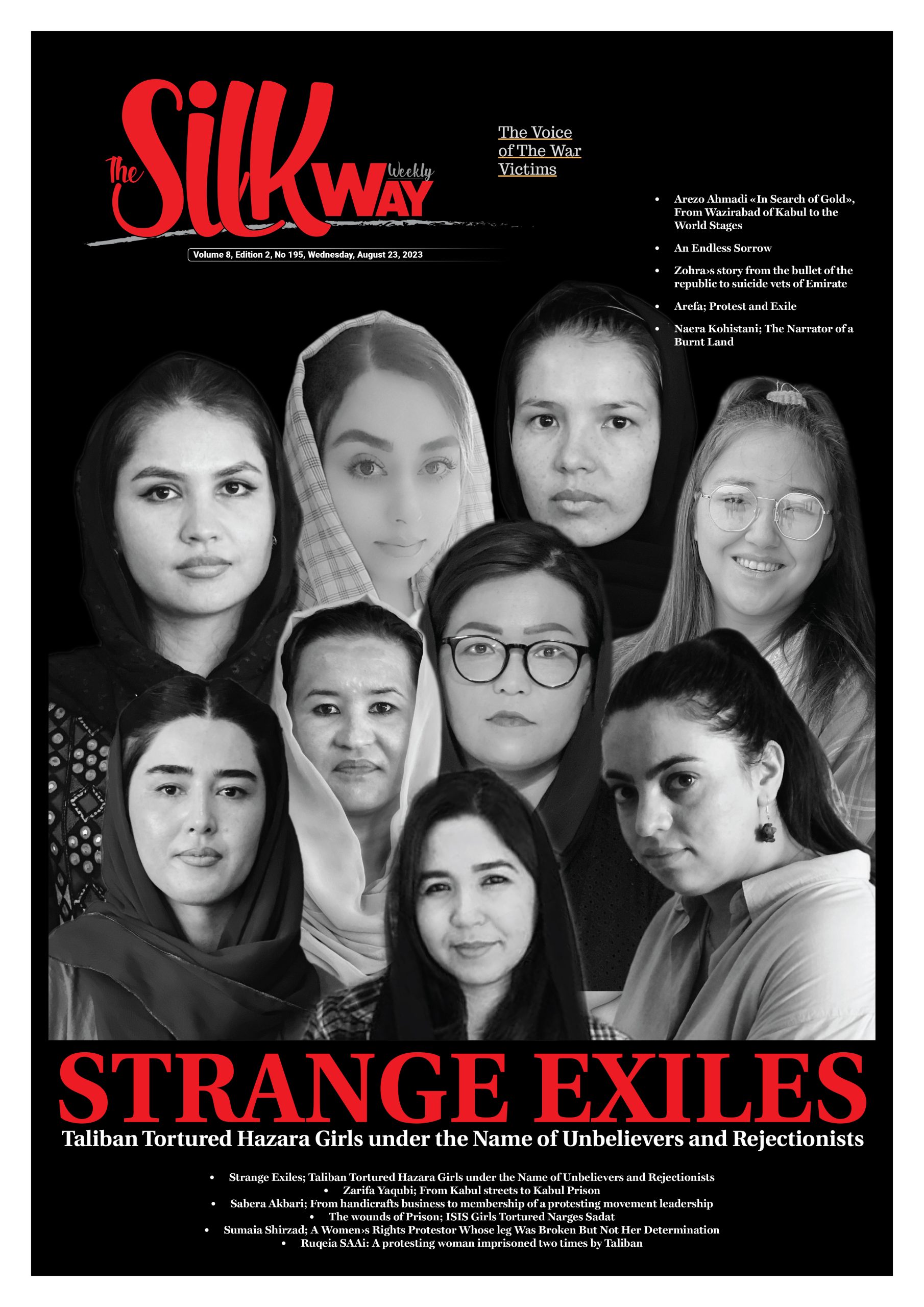 By: Mohammad Ahmadi
By: Mohammad Ahmadi
Translated by: Mohamad Rezaie
Yet, she was a child when her family moved to Kohistan district, Kapisa from the fear of Taliban. In September 1996, When Taliban entered Kabul from the mountains and executed the president Najibullah, and they feared Taliban may kill her father too because Khilda’s father served in Khaad, the intelligence of Dr. Najib government. Her father who had witnessed Najib’s execution, had escaped from Kabul to Kapisa and then had called his family members to come to Kapisa as soon as possible and join him there. “My father told us he has been on his way to the office when he saw Taliban executing Dr. Najib on Aryana square, in front of the presidential palace.” Naera said.
Nadira said Taliban arrested her father after a while and he was in the prison for 40 days. “They had arrested my father. He was tortured for 40 days. When he came home, it was difficult to recognize him. His stomach had… and they had shaved his head. one part of his head was torn. He could not walk and was on the bed. Then my father fled to Iran.” Naera said.
Taliban and the fame of burnt land
Naera is the narrator of the black history, burnt land and forbidden land of Shamali (Northern Afghanistan); a land that Taliban had announced its grapes haram and its sparrows as enemies. Taliban in the first period of their dark rule on Afghanistan, attacked on Shamali, killed its men, women and children, set on fire the gardens, harvests, jangles, and grape yards, and destroyed its water canals and bombed its walls. In another word, about 200,000 from Parwan, Kapisa and north of Kabul were displaced and went to Panjshir and many people disappeared. According to the UN Taliban had forced about 400,000 people from their homes. Jibrit Komin the then UN spokesperson on refugees had said in Genva “Taliban force these people to get on buses and trucks, and go to Kabul and Jalalabad. Taliban separated women and children from men.”
Naera remembers well when Taliban were sending their troops to Shamali and she and her mother had escaped to Pnjshir from the fear of Taliban. Naera said Taliban had planted a hand bomb in their house and parts of it had been destroyed. “It was late at night, when we were informed by the mosque Taliban had entered Kapisa. People left their houses and moved to Panjshir along with their family and cuttles. We arrived in Panjshir in the morning. Some of the cuttles of the people sank in the water. The valley was narrow and many people were pushing to Panjshir. Naera said.
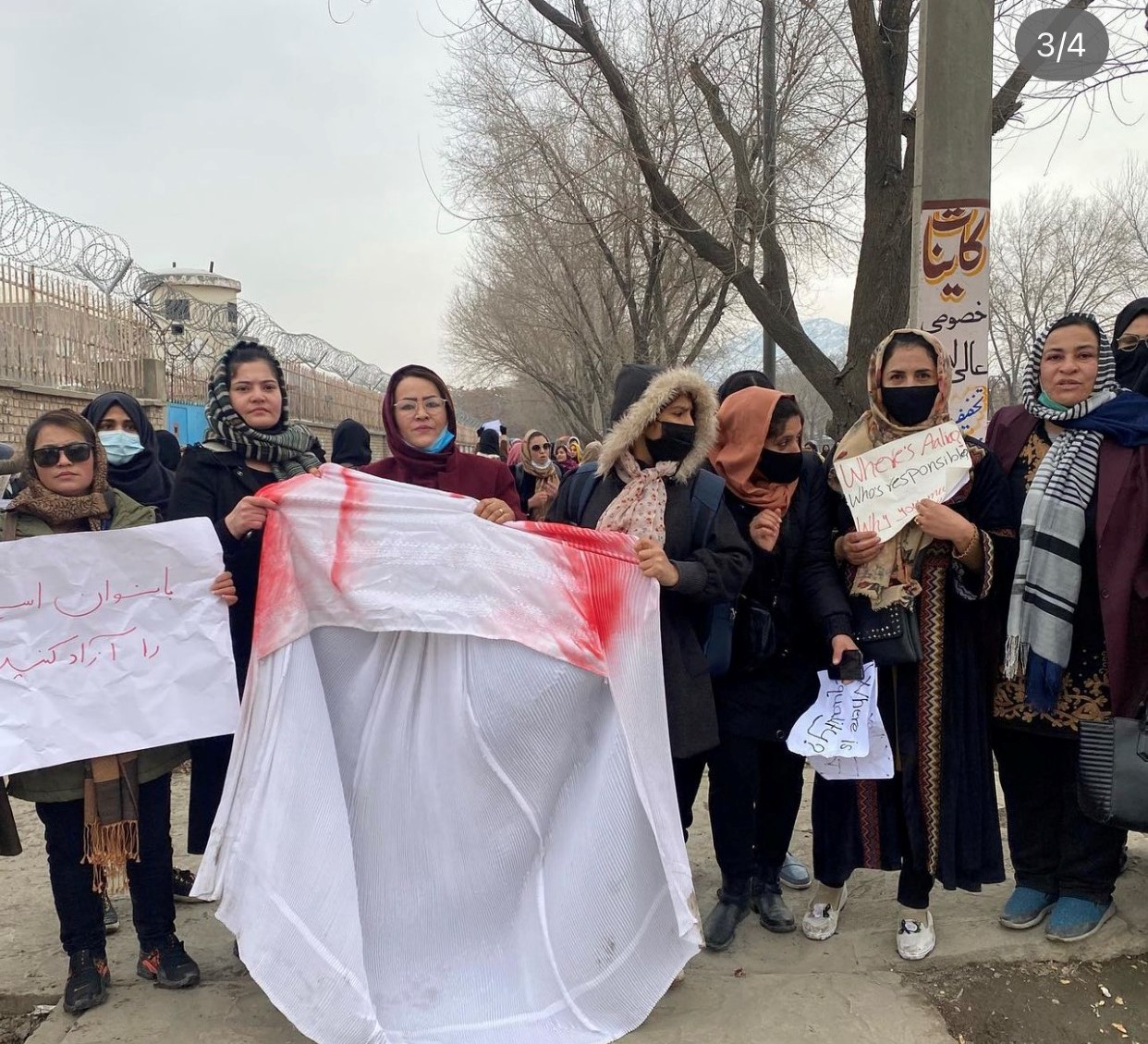 There were many tragic events on the way when the oppressed people of Shamali were going to Panjshir. Naera said she and her mother saw an 8 old girl and an infant child and no other their family members with them. The girl told Naera’s mother her mother and brother had fallen into the river and killed, and she was left alone with this little hungry and thirsty infant. “The infant child had not drunk milk. The girl had asked my mother to milk the infant. Then she had told my mother she could not carry the infant with her and she may throw the child into the river. Then my mother give milk to the child. After that, I don’t know what happened to the infant child because everyone tried to save themselves.” Naera said.
There were many tragic events on the way when the oppressed people of Shamali were going to Panjshir. Naera said she and her mother saw an 8 old girl and an infant child and no other their family members with them. The girl told Naera’s mother her mother and brother had fallen into the river and killed, and she was left alone with this little hungry and thirsty infant. “The infant child had not drunk milk. The girl had asked my mother to milk the infant. Then she had told my mother she could not carry the infant with her and she may throw the child into the river. Then my mother give milk to the child. After that, I don’t know what happened to the infant child because everyone tried to save themselves.” Naera said.
Taliban had changed Shamali to a burnt place with hungry people. Naera said Shamali people faced a severe draught after Taliban attacked Shamali and set on fire the gardens and vineyard of the people. There were times that there was no bread on the table of the people and the children cried for a piece of bread or smelling the cooking rice. And many children died of malnutrition. Naera said what helped the people remain alive was berry. “The only food was plenty available was berry. It was booth food and fruit of the people.” She said.
Naera Kohistani has been a history teacher. Having a critical view on the history of Afghanistan, she sys the history of Afghanistan is full of lies, forgery and distortion. According to Naera, atrocities of Taliban during the first period of the rule of this groups, has not been documented. She said she had read nowhere about kidnapping the girls by Taliban in Kapisa and they never returned to their homes once they were kidnapped. Sometimes, Taliban kidnapped the girls under the name of the Red Cross and I don’t know whether they were sold to Pakistanis or Saudis.” She said. Naera has studied the first class in three years; because Taliban fired on the school now and then. These rockets caused Naera to finish the first class when she was 9 years old. She said when the area was under the control of Afghanistan United Front led by commander Masoud, the doors of schools were open and they could go to school with no fear. “When I was in Kapisa, sometimes parts of the province were captured by Masoud forces. Then the schools were open. But when Taliban captured the area, they fired on schools and schools were closed for a long time.” She said.
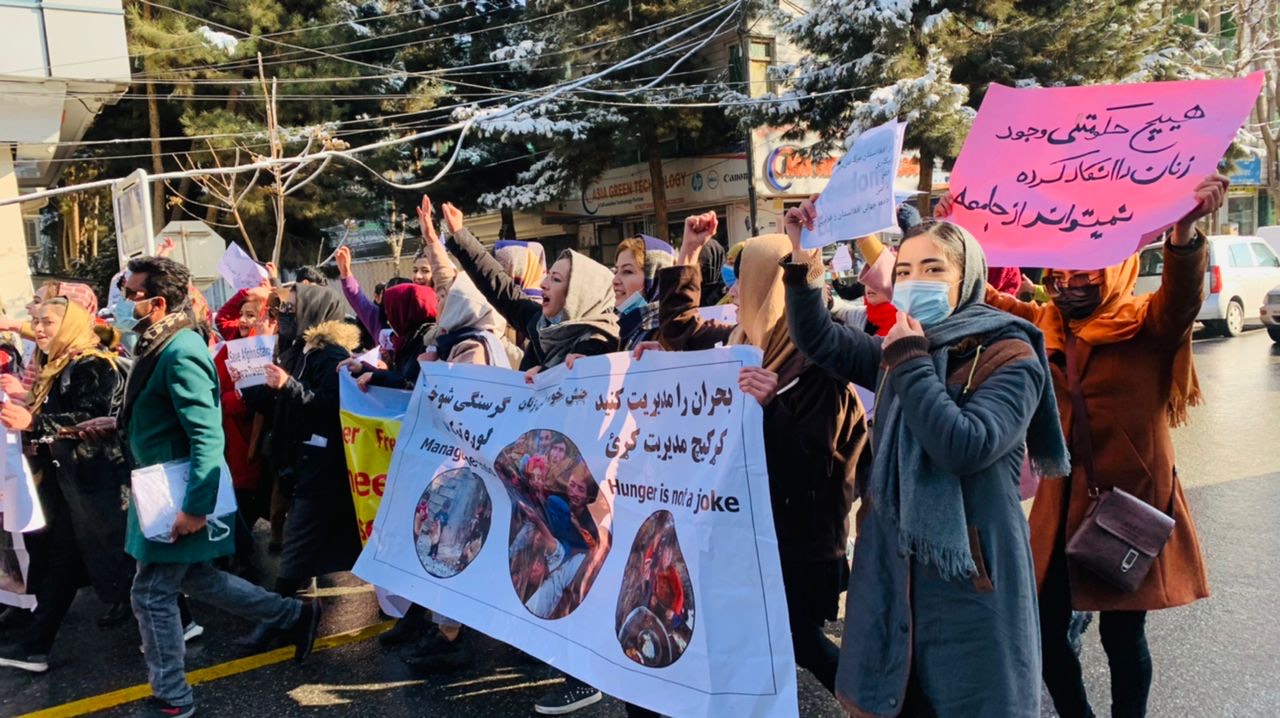 The Fall of Taliban; The Rise of Life
The Fall of Taliban; The Rise of Life
The Taliban government was toppled by NATO forces in 2001 and the republic replaced the Emirate in Afghanistan. After he collapse of Taliban, Naera’s father returned from Iran and started a private business. An official who had worked in Khad during the Najib’s government, now was working as an electrician. Neara and her mother also returned from Kapisa to Kabul and started everything from the scratch. Naera finished school and university in Kabul and then married. She taught in a private school in Kabul and she wished to become a professional athlete to win medals and gain honor for Afghan women. “I was in grade 10, and joined the team of our high school. There was a stadium in our high school and during the first period of Taliban, it was used for stoning men and women. I loved to hold athletic events there and win medals.” Naera said.
Fifteen of August; the Decline of Life
Naera has been teaching history when the head master came, knocked and whispered Kabul had collapsed and Taliban had entered the city. The head master emphasizes, no one shall leave the school before the students are evacuated. Naera who had experienced the first round of the Taliban government, hearing the sad news, fainted. She hardly could get up. The head master told Naera to take a taxi and go home. But she refused it and said, first the students shall go home. After all children went home, she went home while she was in horrific mode and was afraid of Taliban.
Nadera said, on the first days of Taliban takeover, Evacuation process was going on and the western countries were evacuating those whose lives were in danger from Kabul airport. Naeara’s father who had experienced the prison of Taliban, decided to leave the country. As a result, Neara went to the Passport Directorate to get a passport. Naera said there were too many people to get passports. Taliban beat people with cable wires to align their lines. Taliban even beat women and children. Naera said when she was in the line of passport, a Taliban fighter hit with cable on her shoulders and she fell on the ground due to the pain. She hardly could take her out of the crowd and took a taxi and went home in Sara e Shamali. “When I get to home, my mother opened the door, and I fell to the ground. I regained consciousness. There was blood in the place of cable. Naera decided to fight against Taliban on Kabul streets. “This pain caused me to go to Kabul streets. I warned my family not to interrupt me. I thought I was alone. I found some other protesting girls and joined them. Hoda Khamosh added me to the WhatsApp group of the women’s rights protesting girls. Next day I went to the street. I had nothing to lose; I neither had a palace nor a building. I had no jewelries and ornaments. I was just a teacher and Taliban also had taken this one from me.” She said.
Some women’s rights protestors decided to hold a protest in Kabul on education ban on girls above seven grade. Naera said she was the first protestor who left home at 6: A.M in the morning and moved towards Shahre Naw of Kabul and reached there at 8: A.M. On that day she only had 50 afghanis. Other women’s rights protestors joined Naera after 45 minutes. And the started their protest march chanting “Bread, Work and Freedom.” Taliban violently suppressed the women’s rights protest and the protestors were scattered and went home.
 Naera said in addition to street protests against Taliban, she has been active on X (former Twitter) and I drank coffee some nights in order not to fall asleep and do more twits against the Taliban group. “We were active on twitter at nights. We conducted twitter spaces. We talked about our goals and programs. We talked about the threats facing us. We drank coffee no to go to sleep. When we took to the streets, we usually took several clothes and head scarves in order to change our appearance. When the protested ended, we went home from different directions.” She said.
Naera said in addition to street protests against Taliban, she has been active on X (former Twitter) and I drank coffee some nights in order not to fall asleep and do more twits against the Taliban group. “We were active on twitter at nights. We conducted twitter spaces. We talked about our goals and programs. We talked about the threats facing us. We drank coffee no to go to sleep. When we took to the streets, we usually took several clothes and head scarves in order to change our appearance. When the protested ended, we went home from different directions.” She said.
Naera continued her street protests against the Taliban group until she is identified and searched by the Taliban intelligence. She had to change where she lived. But she never surrenders to Taliban and continues disclosing Taliban policies. “I was in Kabul until March 2022. I participated in 5 street protests. We held news conferences and cultural programs. We said no to the forced hejab.” She said.
Naera siad, When Taliban arrested Tamana Pariani and her sisters, I talked with BBC and the BBC reporter asked me about the videos shared by Pariani. When Taliban broke into Pariani’s house, she shared a video and asked the people to help her and kept saying Taliban wanted to break into her house.
In the mid of interview, Naera was informed by her husband that several Taliban Ranger military vehicles were in their alley and may arrest her. On the same night, Pariani’s twitter was hacked by Taliban and Taliban intelligence may had found her home address from the twitter. Naera said she went to one of her neighbors house and then one of the organizations which worked to protect the women’s rights protestors, had taken Naera and some other protestors to a safe house in Shahre Naw of Kabul. According to Naera, Moorsal Ayar, one of other women’s rights activists used to come there and Taliban arrested Ayar from her house. According to Naera, they had changed her locations for seven times. And finally, they moved her to a safe house in Shirpoor of Kabul where Naera and some other women’s rights protestors were arrested from there. “Shrpoor was the seven house we were moved in. Taliban arrested us from there. I was in the prison for 15 days along with my husband and two children. They had beaten and tortured my husband a lot. He bled.” She said.
When Naera was released from the prison, she had an interview with Persian Independent about the prison and arresting women. It further incited the Taliban. Then she decided to leave Afghanistan. Naera siad she left home with her son at 4: A.M. and moved towards Torkam border. “I left home at 4 o’clock. I had taken one book, a pair of clothes and my son. My wife and daughter remained in Kabul. They did not have passports. My daughter, who is still a child, joined me after six months. After 8 months, my wife also joined us.” She said.
Homelessness in Pakistan for Neara is the same as the cemetery Taliban had created for Near in Kapisa and Kohdaman in 1998. Naera an other Afghan women experience a similar pain they experienced in Afghanistan. The only difference is that they experience the same pain in a different geographical location.
Difficulties and hurdles of migration can’t stop Naera from protesting Against the Taliban policies. She went on a hunger strike with some other Afghan women. Hunger protest was organized by Tamana Pariani, one of Afghan women’s rights protestors.


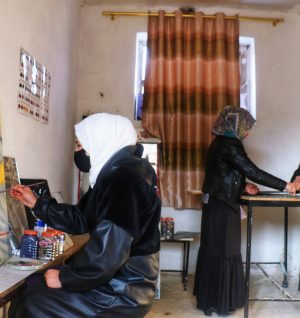
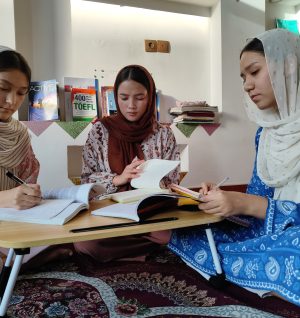
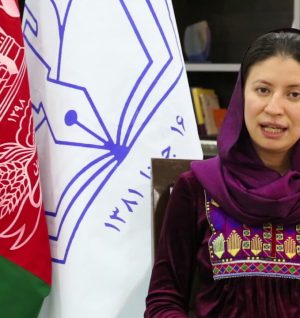
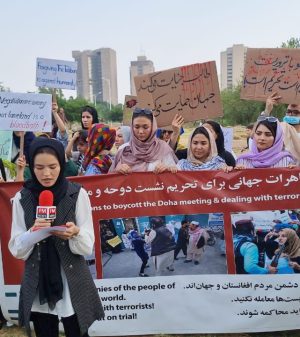
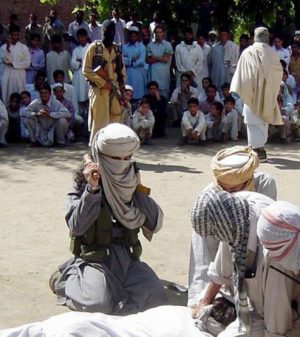
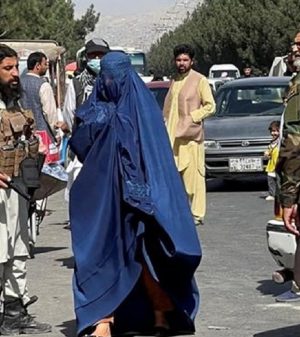
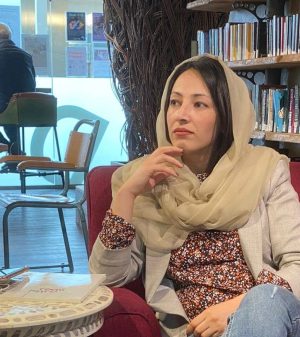
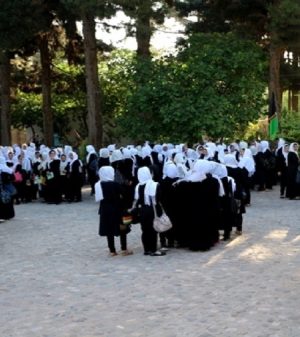
Add Comment